|
The Department of Biological Sciences is committed to providing a rigorous curriculum
to meet the needs of our diverse student population through courses, guided research
and service opportunities. We strive to prepare our students for professional careers,
advanced studies and to become global citizens. Towards this end, our programs foster
an environment that encourages a strong educational foundation that is supported by
innovation, entrepreneurship, leadership, and community service.
In pursuing this mission, the aims of the Department are:
A. Provide Training
- To provide our students with rigorous but flexible curriculum for timely matriculation
through the program.
- To prepare students for diverse and demanding graduate programs by providing them
with current knowledge and hands-on experience with advanced technologies.
- To provide non-majors with the skills, background, and scientific vocabulary to be
informed citizens.
- To increase diversity in the sciences by providing well-trained scientists prepared
for national and global marketplace.
- To produce science teachers with the ability to effectively communicate scientifically
at all levels.
B. Provide Research Experiences and Opportunities
- To provide robust opportunities for independent research through our facilities, studentships/internships,
and collaborators at other organizations.
- To integrate current research with teaching thoughout our curriculum and provide a
supportive and focused research and training environment.
- To train future scientists, teachers, medical practitioners, pharmacists and other
professionals in the ethics of scientific inquiry.
C. Promote Leadership, Intellectual Engagement, and Community Service
- To develop leadership skills through biological organizations and group work.
- To foster intellectual curiosity and create lifelong learners.
- To encourage service and involvement in the community as a part of the program to
promote engagement by the community with departmental activities.
|
|
Assessment is strongly linked to our Mission Statement and assessment of our courses and is of increasing importance as we evaluate our core
curriculum, our options for majors, and our service course offerings. Our faculty
are committed to assessing the effectiveness of our courses, and a number of our faculty
have developed their own assessment instruments that are tailored to their courses.
The department employs both indirect and direct assessment strategies. Students in
our entry-point course for our core curriculum (BIOL 1710) are tested on conceptual
understanding before and after the course. Students are indirectly assessed via self-surveys
in each of the core curriculum courses. The faculty will evaluate these instruments
and employ other metrics to better determine what new information is being gained
by our students. This is challenging, in that many students transfer into (and in
some cases, out of) Chicago State at different points and with different backgrounds.
Many of our assessments remain summative ones (e.g., exams, practicums), but formative
assessments are also employed (e.g., student surveys of the effectiveness of course
materials). The current assessment plan and prior assessment reports are available
in the departmental office (SCI 310).
Participation by students in assessment is solicited by the Department, both to assess
curriculum effectiveness and to evaluate academic progress by our students. This is
requested near the beginning of the student's program, at various points through the
student's program, and after graduation (see Student Testimonials). Responses by students
to departmental offerings are considered to be very important in determining how to
improve departmental options and course offerings.
Development of our assessment aids is becoming more formalized, and we are initiating
more frequent and specific assessment reviews. To enhance this, we have recently developed
a Google Sites area to share assessment documents and other information among the
faculty.. Our departmental seminar series has for years featured presentations by
undergraduates who have worked in our facilities and other programs and internships,
and we also require regular progress reports by graduate students, which are presented
as part of the weekly department seminars. This allows all students and faculty the
opportunity to view current research in the entire program, learn about potential
opportunities, compare standards in different disciplines, and view the growth in
the expertise of our students. Presentation by faculty of teaching ideas and techniques
has also become a part of these regular seminars.
Standardized assessment descriptions can be viewed by clicking on the following links:
|
| John FK Brown, BS in Biology, 2015 |
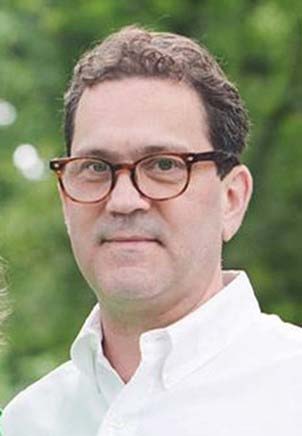
Science Teacher, Lincoln Park High School, Chicago Public Schools.
Chicago State University prepared me to be a highly effective science teacher from
my first day on the job to today. I can directly relate my experience as a student
in the biological sciences program at CSU to my daily practice as a science educator
because of the complete and thorough program curriculum. The faculty and department
were clearly dedicated to my mastery of Biology and the required Chemistry and Physics
content, but the program also included interdisciplinary studies from Food Justice
to Educational Philosophy which not only changed my life but also allowed me to more
deeply impact the lives of my students. I am immensely grateful for the training I
received from the CSU Biological Sciences Department, my advisor, and the highly qualified
professors involved in the science teacher preparation program. I will always be
very proud to be a CSU alumnus.
|
| Noah Oben, BS in Biology, 2013 |
|
Pharmacists, Roseland Hospital, Chicago. PharmD 2018, Manchester University, Indiana.
In 2010, I transferred from the University of St Francis in Joliet to Chicago State
University. It was a big cultural difference and I had that feeling of belonging.
I was enrolled in the Department of Biological Sciences and I really want to emphasize
on the fact that the department was very invested in the student’s success. My success
as a Doctor of Pharmacy today is thanks to the solid science foundation I had from
CSU. I was better equipped to face the challenges and difficulties in pharmacy school
with much ease. I am extremely grateful for the training I received in the Department
of Biological Sciences. The highly qualified faculty in this department prepared me
to excel beyond CSU. I would not hesitate to give back in anyway possible when the
opportunity arises. I am proud to be an alumnus of CSU.
|
| Ana Nevarez, BS in Biology, Spring 2013 |
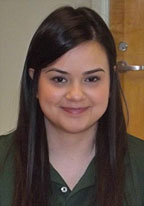
Being a student at Chicago State University has been a wonderful experience and the
start for many great opportunities to come. I came to the university as a transfer
student looking for an affordable and quality education and it is exactly what I found.
My professors have always made themselves available to me whether it is during office
hours, phone or email which is very convenient since I do commute to campus from home
and hold a part-time job. In addition, many of my instructors serve as mentors to
me and are very supportive of my career goals. I am grateful especially for the biology
department which is very resourceful and exceptional when it comes to providing and
informing students about research and learning opportunities.
I have also had many learning opportunities outside the classroom by taking part in
extracurricular activities. I am current President of the Pre-Pharmacy Club and Sigma
Lambda Gamma Sorority, as well an active member of the Organization of Latin American
Students (OLAS). By being involved in these organizations, I got the opportunity
to participate in the Student Engagement Project at the CSU College of Pharmacy, attend
national conferences such as USHLI and HACU, and help organize cultural events on
campus. I am always happy to share my experiences with my family and was recently
even able to convince my parent to be environmentally conscious thanks to the knowledge
I gained in Ecology and other biology courses! I am truly satisfied with the many
ways CSU has helped me grow.
|
| Kellen Marshall-Gillespie, BS in Environmental Biology, 2009 |
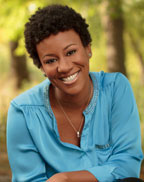
Chicago State was a welcoming university with faculty members dedicated to my personal
and professional success. As a returning student, I was coming into the university
with a drive to complete my degree, yet wasn't sure about where I would go in terms
of a career. The purposeful programs at CSU were astonishing in terms of how they
were not just going to allow students to waiver in professional uncertainty. I participated
in programs such as Louis Stokes Alliance for Minority Participation, T.I.LT., MBRS,
and the CSU Minority Internship Program.
I was mentored essentially by all the faculty members within the Biological Sciences
department and began to understand the value of academic culture. I began to accept
my gift for STEM fields and took advantage of all opportunities which would make me
a more competitive and employable scientist. As an undergraduate I wrote a grant for
our award winning prairie, something an undergraduate had never done before. What
was interesting about that experience is that not one individual doubted my abilities
to do this nor did any faculty, or staff impede the process. It was obvious that the
CSU family wants their students to exceed the standards and not just meet them.
As a current doctoral student I am proud to say I am a CSU alumna. Often, people are
confused as to how I was able to skip a Masters program and go straight into a PhD
program. I tell them CSU ensured my abilities through allowing me to build a professional
CV while pursuing a degree. My course work, coupled with internships and research,
only strengthened my abilities to competitively apply for graduate programs. Furthermore,
I was trained so well that I had more experience writing, and presenting by the time
I completed my B.S than some applicants with Masters degrees.
Imagine being flooded with requests for your graduate application. That was how my
final two semesters were at CSU. Because of my own diligence, supported by the faculty,
I can certainly say this institution graduates leaders. I am forever indebted to those
who mentored me and helped me develop into the professional I am today. These connections
still have their perks, as I always enjoy coming back to CSU to remind current undergraduates
that CSU is what you make it. If you invest in the institution as an undergraduate,
it will pay you back in the most unexpected ways.
|
| Jeanie Ramos, MS in Microbial/Molecular Biology, 2007 |
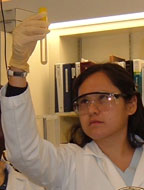
Looking back on my experience at Chicago State University I find myself reminiscing
on many fond and positive experiences. The curriculum was straightforward and we had
a variety of classes to chose from. Professors were always willing to help and were
available for one-on-one tutoring. I never felt like another number to my professors.
Classes at CSU provided me with a wide variety of skills, starting with how to properly
read a journal paper. I still use that skill to quickly scan journal articles and
extract exactly what I need. I don't find myself confused or overwhelmed with minute
details. More importantly, CSU taught me how to be a critical thinker. Between the
Biostats class and the Molecular Biology class I really had to dig deep and use neurons
that were never activated before. These classes were not about regurgitating facts,
but instead we had to learn the facts and apply "logical thinking". These classes
were structured in such a way that critical thinking was encouraged and expected.
Professionally this skill is invaluable. I often look at work problems, apply the
facts and begin the process of logical thinking. Usually, I can come up with at least
3 solutions to any pending problem and I can narrow it down to the best solution.
Personally, CSU is still a part of my life. I am still in contact with my former advisor,
Dr. Andrew Maselli. He is genuinely invested in the progress and success of his students
and I was extremely lucky that he pushed me to finish my degree. He taught me to always
take a second look at my work and, if possible, make it better. After CSU, I found
that passionate and considerate professors are like "looking for a needle in the haystack".
I can now look back and say he was one of the best professors. Furthermore, I still
keep in touch with colleagues from CSU, some are still part of my life and have been
there for major milestones in my life (i.e. wedding, babyshower, etc). Overall, my
experience at CSU has made an impact on my life both professionally and personally,
I often look back with fondness at the work and the friendships I made during my time
at CSU.
|
| Juan F. Reyes, MS in Biology, 2006 |
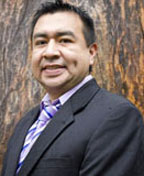
As a student with a bachelor’s degree from theUniversity of Illinois at Chicago, I
wasnot sure whether I wanted to pursue a career in medicine (MD) or in scientific
research (PhD). Fortunately, CSU offered a master’s program that allowed me to learn
firsthand the research skills necessary for a successful career in scientific research,which
set me on the path to pursue my PhD. As a master’s student, the individual attention
from professors in a classroom setting, as well as in the laboratory, provided me
a unique opportunity to learn the rewarding benefits of scientific research. The invaluable
opportunities offered by CSU further provided me with the tools necessary to enter
Northwestern University and begin my position as a PhD student. Today, I hold a PhD
fromNorthwestern University. My scientific career up to this point has involved research
projects at CSU and Northwestern that have resulted in several publications in notable
journals. I have found scientific research truly rewarding. I’m currently working
as a post-doctoralfellow at Lund University, Sweden on the prion-like mechanisms of
Parkinson’s disease.
|
| Kristy N. Mielcarek, BS in Environmental Biology, 2003 |
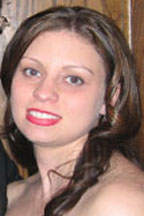
I am a 2003 graduate of Chicago State University. Chicago State University was just
the right fit for me. I enjoyed the luxury of small class sizes, and the individualized
attention from the professors. I relished the challenge of the curriculum, and in
2003 earned a Bachelor degree in Science majoring in environmental biology with a
minor in chemistry. I found that my time at Chicago State sufficiently prepared me
to take the PCAT; scoring above average, I was accepted to the first pharmacy school
I applied to. I now hold a Doctor of Pharmacy degree, and have been an Osco pharmacist
for five years. I am proud to be a graduate of Chicago State University, and urge
others to take the challenge.
|
| Alicia Brown, BS in Environmental Biology, 2002 |
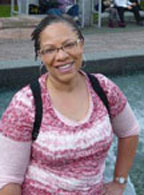
I am a 2000 graduate at Chicago State University. I applied to CSU because they had
the best curriculum. It wasdifficult finding an environmental and technical program.
In addition, CSU wasa military-friendly university (before the term became popular),
professors were willing to help me when I had to leave for military purposes. The
classschedule allowed me to continue to work and attend classes full-time and part-time
as needed. One of my favorite stories that I like to share with others is how I needed
one class to graduate but no one registered for the class. Dr. Bellwent out his way
to make it happen. The only catch was that I couldn’t rely on others to answer any
questions.
My education has helped me in numerous ways, both in my professional career and in
my personal life. I have developed my skills to obtain several promotions within my
employment. In addition, I have earned my Masters in Environmental Management, and,
due my CSU training, I had already acquired much of the necessary knowledge, as well
as the prerequisites I needed.
|
| Shawn Cirton, MS in Environmental Biology, 1999 |
|
The education and experience that I received from the Chicago State University Biology
Department was invaluable and set the foundation for my career as a Wildlife Biologist
for the U.S. Fish and Wildlife Service (USFWS). The various classes that I took in
the department provided the knowledge that I would need to understand biological concepts
when I started working for the USFWS. Classroom activities were not the only valuable
experiences that helped provide the foundation for my career, the numerous field activities
and field trips that I participated in with Dr. Peters and Dr. Bell helped build that
foundation as well. Who would know 13 years ago that I would be going back to some
of those same locations as a part of my job, and in some cases to protect those areas?
The guidance provided by Dr. Peters started from the first classes that I had with
him, and continued through to my graduation with a Masters Degree in 1999. There were
hard times when I first started in the Masters program, but the guidance provided
by Dr. Peters and other professors helped me overcome those hurdles. Their guidance,
and my hard work, led to me being awarded the Graduate Division Award in 1998 and
1999, successfully defending my thesis, and graduating from the program.
The Biology Department provided me with the basic tools to obtain an internship with
the USFWS, which quickly lead to a full-time position. Future students would be well
served by the professors and staff in the Biology Department in meeting their needs
to grow as professionals
|








 All Rights Reserved
All Rights Reserved